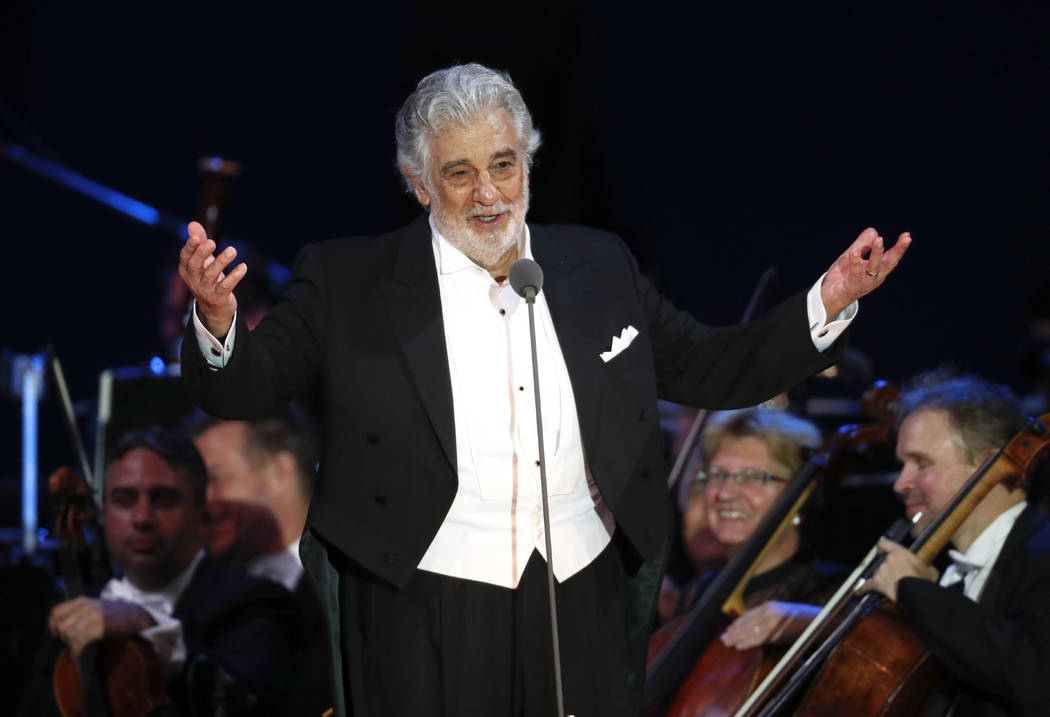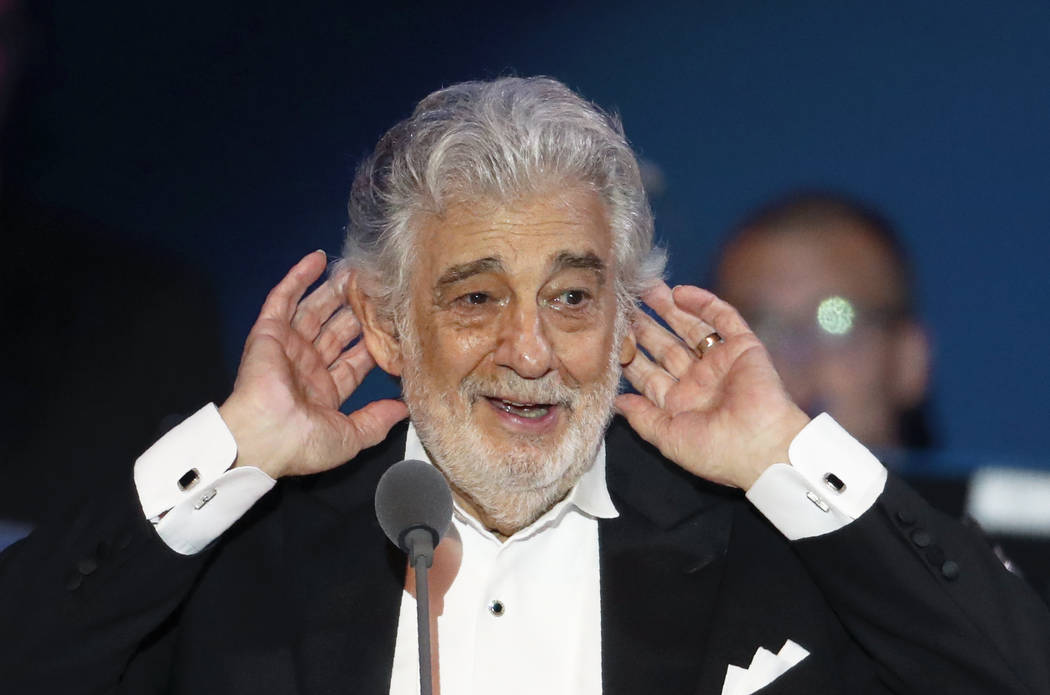Placido Domingo withdraws from Met Opera after harassment reports
NEW YORK — The Metropolitan Opera announced Tuesday that Placido Domingo had agreed to withdraw from his slate of scheduled performances at the opera house following allegations of sexual harassment made by multiple women in two Associated Press stories. The opera legend indicated that he would never again perform at the Met.
Domingo had been scheduled to sing the title role in the season premiere of Verdi’s “Macbeth” on Wednesday night, which would have been his first performance in the United States since the AP reported that numerous women had accused him of inappropriate behavior, including one soprano who said he grabbed her bare breast.
The Met had been under increasing pressure to cancel Domingo’s appearances, but general manager Peter Gelb reiterated to performers after a dress rehearsal Saturday that the opera house was awaiting results of investigations by the LA Opera, where Domingo has been general director since 2003, and the American Guild of Musical Artists, the union that represents various opera staff.
Domingo, who had sung in rehearsals, issued a statement saying his Met career was over after what the company said was 706 performances as a singer, plus 169 as a conductor.
“I made my debut at the Metropolitan Opera at the age of 27 and have sung at this magnificent theater for 51 consecutive, glorious years,” the star said. “While I strongly dispute recent allegations made about me, and I am concerned about a climate in which people are condemned without due process, upon reflection, I believe that my appearance in this production of ‘Macbeth’ would distract from the hard work of my colleagues both on stage and behind the scenes.
“As a result, I have asked to withdraw,” he added, “and I thank the leadership of the Met for graciously granting my request. I am happy that, at the age of 78, I was able to sing the wonderful title role in the dress rehearsal of ‘Macbeth,’ which I consider my last performance on the Met stage.”
In its statement, the Met said the long-married, Spanish-born superstar had “agreed to withdraw from all future performances at the Met, effective immediately.”
Gelb sent an email to the Met staff saying, “We are grateful to him for recognizing that he needed to step down.”
The Philadelphia Orchestra, San Francisco Opera and Dallas Opera previously canceled upcoming concerts starring Domingo after the AP stories were published. But his reception has been far different in Europe, where he received lengthy ovations after concert performances of Verdi’s “Luisa Miller” at the Salzburg Festival in Austria on Aug. 25 and 31, just weeks after the initial AP story.
Angela Turner Wilson, the singer who allowed the AP to use her name in accusing Domingo of grabbing her breast, said she was “relieved” by the Met’s action, but criticized Gelb for previously asserting that the opera house could not act without corroborated evidence and that all of Domingo’s accusers were anonymous. She called Gelb’s remarks “a major concern to me and many others who wish to see the current culture of sexual harassment and retaliation removed from our industry. It is time.”
Another of Domingo’s accusers, Patricia Wulf, also called the withdrawal a relief.
“I feel like we accomplished something,” said Wulf, who accused Domingo of repeatedly harassing her during performances at Washington Opera in the late 1990s, while he was general director of the company.
“The Met finally stepped up and did the right thing,” she told the AP.
In addition to announcing Domingo’s withdrawal, Gelb said the Met was suspending tenor Vittorio Grigolo pending the outcome of an investigation opened Tuesday by The Royal Opera in London, which said he was alleged to be involved in a Sept. 18 incident when he sang the title role in Gounod’s “Faust” on tour in Tokyo.
Grigolo, 42, was scheduled to sing six performances of Alfredo in Verdi’s “La Traviata” at the Met in February and March. He did not immediately respond to an email seeking comment.
The Met fired conductor James Levine in March 2018 after an investigation by a law firm retained by the company found evidence of sexual abuse and harassment. Levine, the company’s music director from 1976-2016, was music director emeritus at the time and denied the allegations. He filed a breach of contract and defamation lawsuit that was settled last month.
Domingo made his Met debut in September 1968 and is known to many beyond opera for his performances as part of The Three Tenors with Luciano Pavarotti and José Carreras. Singing far beyond the retirement age of most singers, he shifted to baritone parts in 2009, extending his repertoire to more than 150 roles. He sang 21 opening nights at the Met, breaking Enrico Caruso’s previous record of 17.
Domingo’s next scheduled performance is in Verdi’s “Nabucco” at the Zurich Opera on Oct. 13. He is not slated to sing in the U.S. until Donizetti’s “Roberto Devereux” at the LA Opera, which opens Feb. 22.
Zeljko Lucic, originally scheduled for later in the run, will replace Domingo and sing all six performance of “Macbeth” at the Met. Domingo also had been scheduled for four performances as Sharpless in Puccini’s “Madama Butterfly” at the Met in November.
Before Domingo’s withdrawal, the New York state senator whose district includes the opera house had called for his removal.
“I believe they have an obligation to hold their performers to a high standard, given the fact that they are one of the world’s most important cultural institutions,” said Brad Hoylman, a Democrat. “They should be thinking also not just about his celebrity and star power, but about the 20 women who allegedly have made complaints. The Met has an obligation to ensure the safety and well-being of their employees and I’m concerned that if they don’t take action on this, this matter might discourage future employees from coming forward.”
Associated Press writers Jocelyn Gecker and Jocelyn Noveck contributed to this report.


















